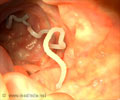- Human Intestinal Parasites - (https://www.ncbi.nlm.nih.gov/pmc/articles/pmc2754014/)
- What Are Intestinal Worms? - (https://www.healthline.com/health/intestinal-worms#symptoms)
- Laboratory Diagnosis of Parasites from the Gastrointestinal Tract - (https://cmr.asm.org/content/31/1/e00025-17)
- Treatment of Intestinal Parasitic Disease - (https://www.ncbi.nlm.nih.gov/pubmed/935916)
- Stool Specimens - Detection of Parasite Antigens - (https://www.cdc.gov/dpdx/diagnosticProcedures/stool/antigendetection.html)
- Common Intestinal Parasites - (https://www.aafp.org/afp/2004/0301/p1161.html#afp20040301p1161-t1)
- Parasites and Worms. Are You Being Eaten Alive From The Inside Out? - (https://sites.google.com/site/christourtruth/parasites-and-worms-are-you-being-eaten-alive-from-the-inside-out)
What are Intestinal Parasites?
Intestinal parasites or stomach parasites live in the gastrointestinal (GI) or digestive tract of the host and take nourishment from the host, on whom they are dependent for their survival.
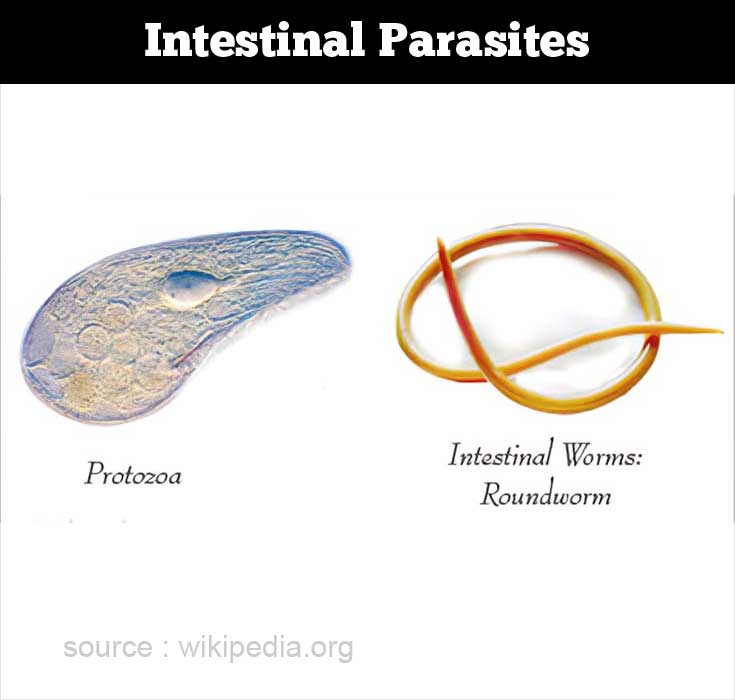
What are the Types of Intestinal Parasites?
Intestinal parasites are categorized as:
Protozoa, which are single celled organisms. They include:
- Giardia lamblia
- Cryptosporidium
- Entamoeba histolytica
- Cyclospora
- Dientamoeba fragilis
- Isospora belli
Intestinal Worms: These include:
- Roundworm or Ascaris lumbricoides
- Pinworm
Tapeworm - Hookworm
- Whipworm(1✔ ✔Trusted Source
Human Intestinal Parasites
Go to source)
What are the Causes of Intestinal Parasite Infection?
Parasitic infections form a major slab of disease in the tropic and subtropic climates as well as in temperate climates. Children are susceptible to a greater degree if hygiene is not maintained. Infections are transmitted in crowded places, places with poor sanitation and unsafe water. There are also some other causes of intestinal parasite infection, such as an international travel, living or visiting an area having the parasitic epidemic or having a weakened immune system (sometimes due to HIV or AIDS). These diseases cause lost ability to attend school or work, growth retardation in children and impairment of cognitive skills in young children.
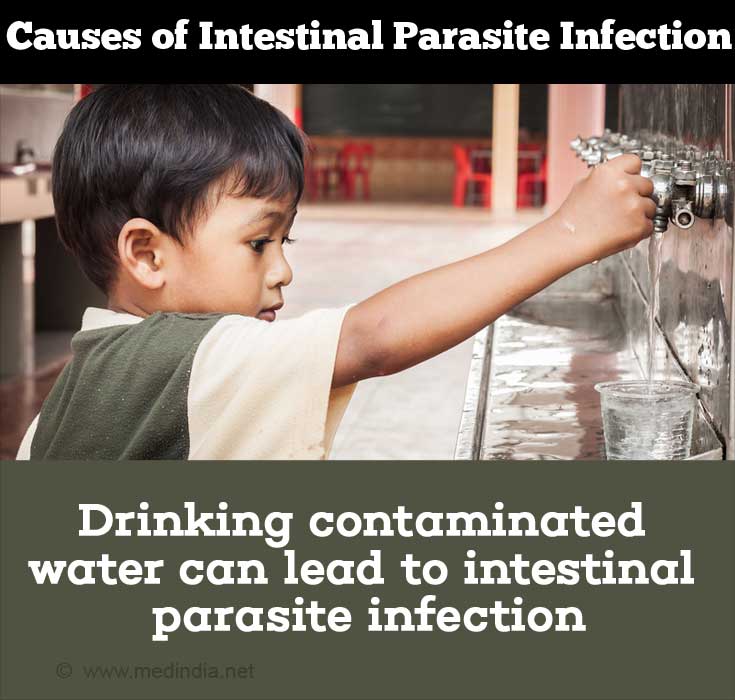
What are the Symptoms of Intestinal Parasite Infection?
The symptoms of GI tract infection due to protozoal infections are:
- Watery diarrhea for more than 2 days
- Tiredness
- Nausea
- Dysentery, with mucus and /or blood in stools
- Weight loss
Further symptoms of GI tract worm infestation include:
- Bloating
- Rash or itching around the vulva or rectum
- Passing of worms in the stools
- Abdominal pain(2What Are Intestinal Worms?
Go to source)
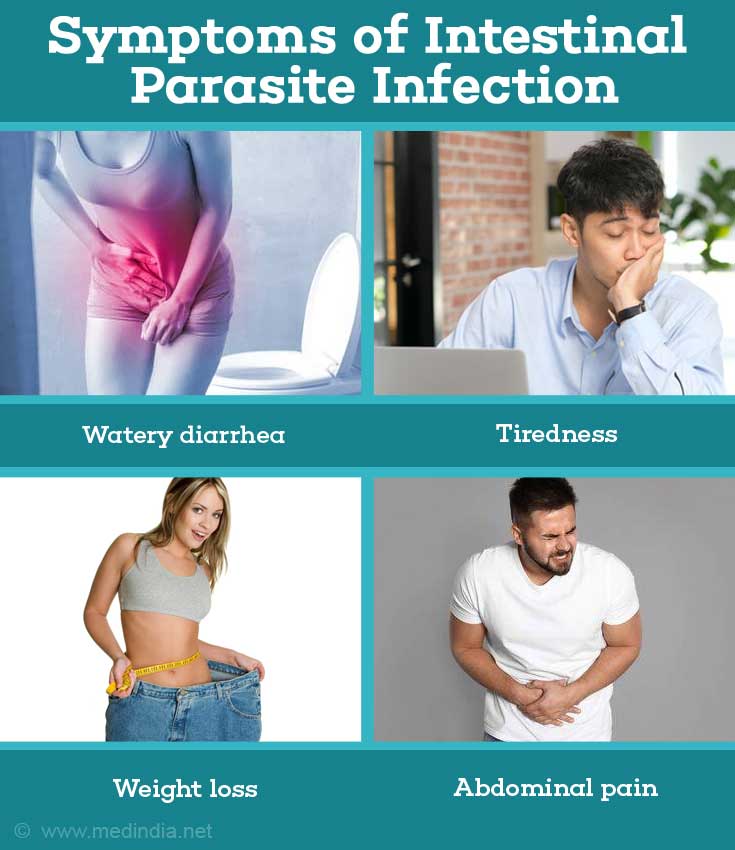
How Do You Diagnose Intestinal Parasite Infection?
Diagnosis of intestinal infections due to parasites include the following:
- Fecal stool testing identifies both helminths and protozoal parasitic infection. The protozoa or the eggs of worms may be present in the stool sample, which can be observed under a microscope.
Another test named “The Scotch Tape Test” identifies pinworms. Since the eggs of pinworms are present near the anus, a tape is applied to the anus several times. The eggs stick on to the tape, which can be examined under a microscope.
- Antigen detection tests: Since fecal examination requires a person skilled in using a microscope, antigen detection tests are used as alternatives. These include tests like the direct fluorescent antibody, enzyme immunoassay and rapid, dipstick-like tests. Some of the antigen detection tests that use stool specimen are available commercially as reagents for the intestinal parasites Cryptosporidium species, Entamoeba histolytica, and
Giardia duodenalis . Diseases diagnosed using kits that accept serum or plasma specimens are available for conditions like amebiasis. Combined test kits are available for the diagnosis of Cryptosporidium and Giardia.(3✔ ✔Trusted Source
Stool Specimens - Detection of Parasite Antigens
Go to source)
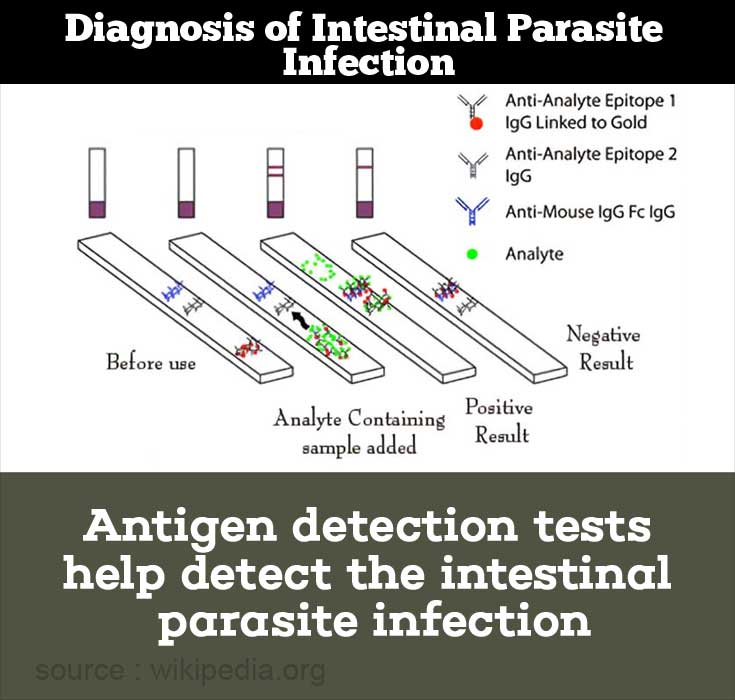
- Small intestinal biopsy: Microscopic detection of parasites in a small intestine biopsy specimen may also be carried out. The small-bowel biopsy is used to diagnose and confirm disease of the lining of the small intestine, for example ulcers caused by amoebae.(4✔ ✔Trusted Source
Laboratory Diagnosis of Parasites from the Gastrointestinal Tract
Go to source)
How Do You Treat Intestinal Parasite Infection?
The treatment option is made based on the effectiveness that the medication renders against the intestinal parasite. The treatment schedule may require one dose or drugs for several weeks. Further, alternative treatments are helpful when taken hand in hand with conventional medications.
Some of the favored medications for protozoan infection include:
- Metronidazole
- Tinidazole
- Secnidazole
- Ornidazole and satranidazole
- Diloxanide furoate
- Nitazoxanide for asymptomatic amoebic infections
Some of the medications used for worm infestations are:
- Mebendazole
- Albendazole and thiabendazole
- Pyrantel pamoate
- Piperazine citrate
- Niclosamide
- Praziquantel for tapeworm infestations(5✔ ✔Trusted Source
Treatment of Intestinal Parasitic Disease
Go to source)
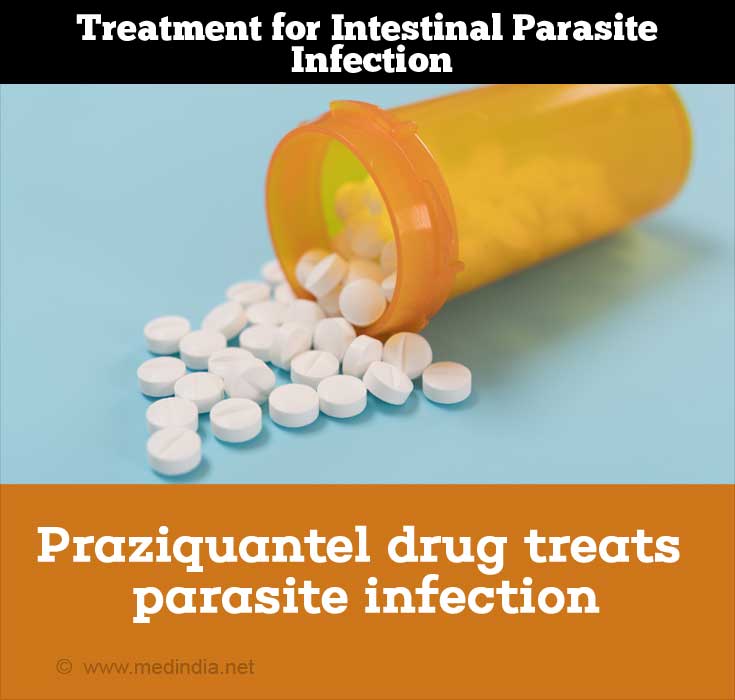
How Do You Prevent Intestinal Parasite Infection?
The best way to prevent GI tract infections due to parasites is to maintain good hygiene. Good hygiene is one of the most important values that each individual must cultivate to lead an infection-free life. Some basic facts that help in maintaining hygiene are washing hands frequently, especially after going to the bathroom and playing outside. Use boiled and filtered water for drinking. One must wash their bedsheets regularly. Drinking water while swimming must be avoided as it is one of the main culprits of parasitic infections. Last but not the least, as pinworm eggs are sensitive to sun light, bringing in sun light to all parts of the house will keep your living environment free of parasites.(6✔ ✔Trusted Source
Common Intestinal Parasites
Go to source)
Health Tips
- Here are a few home remedies for intestinal parasites.
- Ingestion of raw garlic, pumpkin seeds, pomegranates, beets and carrots can prevent parasitic infections.
- Tons and tons of water will help flush out the parasites from our system.
- Eating more fiber helps keep the system clean and get rid of worms.
- Probiotics help keep the digestive tract hail and healthy.
- Papain, an enzyme from the papaya plant, kills worms when taken soon after meals.
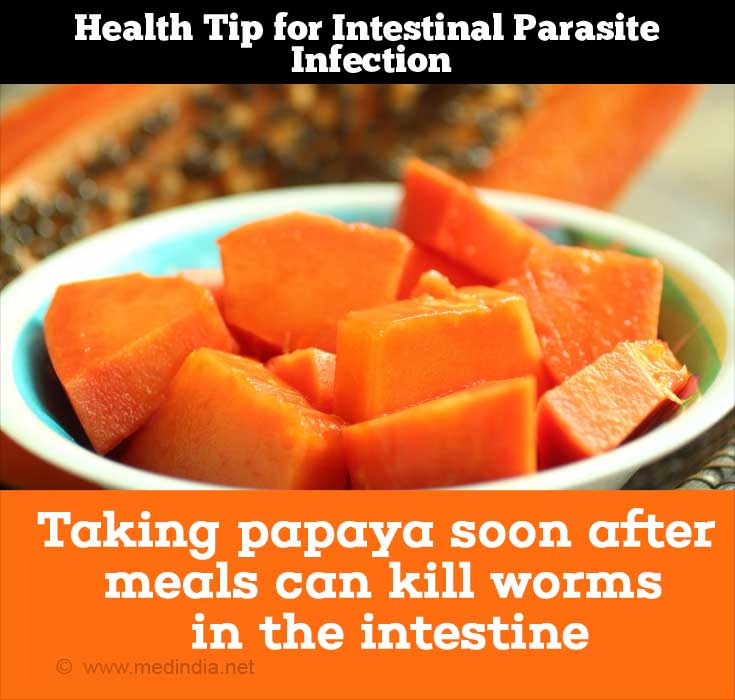
- Herbs such as barberry, goldenseal, oregon grape, anise, curled mint and black walnuts aid in the treatment of parasitic infections. But these herbs interact with other medications and thus guidance from a physician would be advised. (7Parasites and Worms. Are You Being Eaten Alive From The Inside Out?
Go to source)



